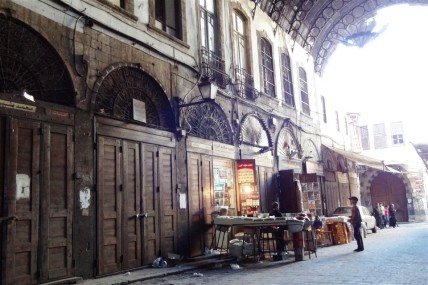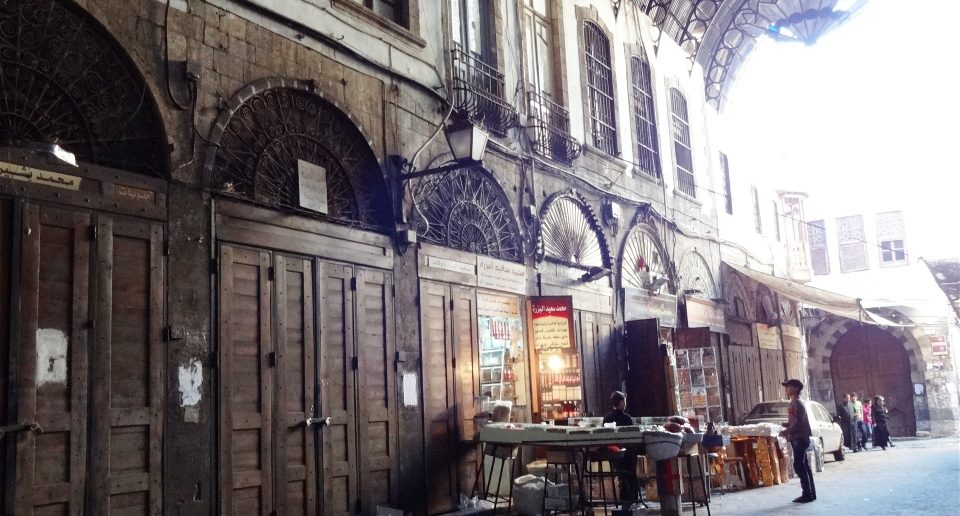
Damascus’ Old Market on a quiet Friday due to sanctions.
Photograph by Heba Aly/IRIN
Humanitarian and developmental aid agencies in Syria say international sanctions against the country have made their operations harder.
Last August, Italian NGO Terres des Hommes (TDH) sent its regular request for a financial transfer from Europe for its aid operation in Syria.
Then it waited. And waited. And waited.
After 15 days of delay, it contacted the bank in Italy, which informed the NGO that the transfer had been rejected.
“Receiving money from Europe to Syria is a disaster,” said Emanuela Rizzo, TDH country representative. The bank required a long list of documents, including the NGO’s agreement with the UN Office for Coordination of Humanitarian Affairs, its memorandum of understanding with the Syrian Arab Red Crescent, a letter vowing not to fund “terrorist” groups, and a list of implementing partners.
After two months and a 200 euro (US$267) administrative fee, TDH was able to get the money transferred through a different Italian bank with an affiliate in Syria. “But it’s becoming incredibly difficult,” Rizzo told IRIN.
Other aid agencies struggling to transfer money have resorted to wiring money to banks in Lebanon and physically driving across the border to pick it up. Aid coming in via social solidarity networks has had to do the same.
Since the beginning of the Syrian crisis in 2011, the USA, European Union, Turkey and the League of Arab States, among others, have imposed a series of sanctions on Syria’s arms, banking, energy and oil sectors, as well as on specific individuals, with the stated aim of stopping state repression of protests, initially, and later, of weakening the government.
“Significant Economic Repercussions”
But as outlined in a 2012 report by the Danish Institute for International Studies “the sanctions regime has had significant economic repercussions beyond the Syrian state and government.”
Through “second-order effects”, like increased inflation, higher fuel and food prices, difficulty importing, higher unemployment, decreasing salary levels, and a fall in purchasing power, including access to food, “the sanctions add to the socioeconomic costs of the conflict and are likely to exacerbate pre-existing socioeconomic difficulties, particularly affecting the lower social strata of the population,” the report said.
While humanitarian aid is exempt from the sanctions, aid agencies say they – like most Syrians – have been affected indirectly. For example, sanctions have made it harder to find and more expensive to procure items for their operations.
Factories have struggled to import raw materials – a result of sanctions affecting bank transactions and contributing to a fast depreciation of the Syrian pound, but also of insecurity affecting supply lines. As such, many vendors that aid agencies used to rely on have shut down.
When the conflict began in March 2011 (shortly before the first round of sanctions in May 2011), the Syrian pound was trading at 47 to the dollar. Today, its value has depreciated to 76 at the official rate and 88 at the black market rate, which has at times surpassed 100.
Before the Syrian crisis, 26 factories producing nappies (diapers) and other hygiene products were registered with the Chamber of Commerce in Damascus. But when TDH put out a tender in October, only four were open and only one made a proposal. Even then, it could not provide the full quantity needed.
“For them, it was not feasible at all,” Rizzo said. As a result, four projects helping more than 4,000 people were delayed by two months.
“Prices have gone up so much,” added Louisa Seferis, emergency co-ordinator for the NGO Danish Refugee Council (DRC) in Syria.
She too is affected by a lack of availability: DRC used to be able to procure winter clothes from one factory in Aleppo that could produce 10,000 pieces a day. Now Seferis struggles to get 15,000 a week, split between several factories.
Other agencies have had to start importing items from abroad at a higher price and with a longer wait.
Trucking companies are now asking for more money to transport humanitarian goods as fuel shortages increase, prices rise and roads become more insecure, according to Radhouane Nouicer, regional humanitarian coordinator in Damascus.
Vendors are also less patient and pickier about payment.
“Procurement has become a real hurdle,” said one aid worker who preferred anonymity. “With every single vendor, their quote is valid for at best 10 days now. You have 10 days to complete the procurement and pay at the price they provide to you. Every vendor wants money right away. The transaction for us takes time. The people cannot wait for money as they could before.”
WFP Operations Affected
A severe fuel shortage has also forced the World Food Programme (WFP), which requires 12,000 litres of fuel per day for its operations, to negotiate with the government for permission – now in hand – to import fuel from abroad for humanitarian operations.
While much of its procurement of food was international to begin with, WFP has shifted even further towards international procurement as local prices have been rising, for two reasons: it became more cost-effective to buy internationally, and buying such large quantities locally would further drive up the price of food.
Most importantly, sanctions have increased humanitarian needs in the country, adding to the aid caseload, Nouicer said.
Many people can no longer afford their medicines or fuel to heat their homes. Others have lost their jobs and are now in need of assistance.
“Sanctions on the banking and energy sectors affect everybody in a country,” he said.
ha/cb




